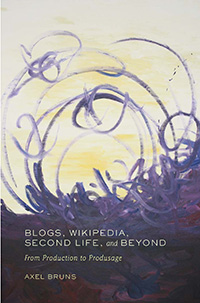You are here
Beyond Toffler, beyond the Prosumer
I'm briefly back in Brisbane before heading back to Europe for the next round of conferences and a good month as a visiting scholar and Alcatel-Lucent Fellow at the Hans-Bredow-Institut in Hamburg. My time here at home has given me an opportunity to reflect on the conferences I attended on the last trip: WebSci '09 in Athens and Prosumer Revisited in Frankfurt.
Prosumer Revisited in particular, which I blogged about here, was an interesting experience - probably my first opportunity to reconnect in detail with the work being done in the overall area of produsage (and some way beyond it) in German academic research. A number of the keynotes at the conference were excellent, and it'll be interesting to follow some of the trajectories they explored.
I remain very much unconvinced about the attempt to make Alvin Toffler's term 'prosumer', now a good quarter-century old, do all the work of carrying this research, though - and not just because with the produser I have my own neologism to offer as an alternative. To begin with, the term 'prosumer' has never been satisfactorily defined, and is now regularly used to mean whatever a particular speaker wants it to mean - that tendency, I'm afraid, was also in evidence in some of the presentations at the Prosumer Revisited conference itself. (Put another way - perhaps we've never properly visited the prosumer when the term was first coined; 'revisiting' it today can therefore inevitably only add to the confusion over how to understand it.)
For Toffler himself, as far as I can make out (and even here, the definition shifts over the decades), the prosumer was for the most part simply an extension of the conventional production line: a way to involve consumers in better reporting their needs and wants to producers, and thus to enable a process of mass customisation. More active, independent customer, consumer, or user agency seems to be denied by this model, though - the prosumer, as I read Toffler, very much remains a (professional) consumer, and fails to make the more towards becoming an active producer in any real sense of the word.
Take, for example, the following two excerpts from Toffler's works, which I cited in my presentation at the conference:
In the end, the consumer, not merely providing the specs but punching the button that sets this entire process in action, will become as much a part of the production process as the denim-clad assembly-line worker was in the world now dying. (The Third Wave, 1980: 274)
Producer and consumer, divorced by the industrial revolution, are reunited in the cycle of wealth creation, with the customer contributing not just the money but market and design information vital for the production process. Buyer and supplier share data, information, and knowledge. Someday, customers may also push buttons that activate remote production processes. Consumer and producer fuse into a "prosumer." (Powershift, 1990: 239)
I find it impossible to reconcile this image of the button-punching, market information-sharing customer who becomes an extension of the assembly line with the contributor to building the communal knowledge base of Wikipedia, the blogger, Flickrer, or Twitterer engaged in what Manuel Castells has described as 'mass self-communication', or even the auctioneer on eBay, and yet all of these have been described as 'prosumers' during the conference (as well as by many researchers and marketing gurus describing such phenomena over the past few years, of course).
Sure, Toffler's prosumer is evident where Apple, BMW, or any other company mines the rich data available from online user communities as inputs into the next round of product design processes, and yes, of course there are now plenty of mass customisation facilities available to us. But there is a qualitative difference between those models, which do simply extend the production line to enable the consumer to press the 'start' button, or which strengthen the feedback loop from consumer to producer, and the produsage models which are prevalent especially online but are increasingly also spilling over into the offline world, and which involve users themselves explicitly, centrally, and even solely as content creators.
To put the point very succinctly:
-
The prosumer, as a professional consumer, assists commercial producers in being better at what they do.
-
The produser, as a productive user, becomes active in their own right in content creation, replacing producers altogether or at least working with them on an equal basis.
And that's a pretty fundamental difference.
Of course, it's also rather unfair towards Toffler to expect his prosumer concept to suit any newly emerging environment, and here especially the digital economy - conceived in the 1970s, the prosumer remains a child of the industrial age.
In that context, I was very gratified to see some of the speakers at Prosumer Revisited pointing very much in the same direction. George Ritzer, for example, confirmed my long-held belief that the division between producers and consumers which makes prosumption possible (and to some extent necessary) in the first place may in fact be an aberration resulting from the upheavals of the industrial revolution rather than a permanent or even natural state; his keynote described very convincingly how a research focus on either production or consumption is a historical error, and needs to be corrected by recognising multiple possible arrangements between the two, especially in the context of digital environments.
So, there was much to like about Prosumer Revisited - but ultimately it feels like there's a need to take a step back before we can usefully move forward in this debate, and to define exactly what we mean by the terms we're using. The prosumer certainly remains useful for some purposes - but we must resist the urge to use it as some kind of cover-all term to describe any kind of customer or user involvement in product development and design or the collaborative creation of content. Especially for the latter, Toffler's 'prosumer' term is patently and demonstrably inappropriate - whether we end up calling participants in such processes 'lead users', 'peer producers', or 'produsers', a different term is needed.
Tofflers prosumers are used to doing a lot of work on behalf of others, but asking them to carry the foundations of our emerging understanding of collaborative content creation is, I think, one task they shouldn't have to be burdened with.
- Snurb's blog
- Log in to post comments
- 23287 reads
 Printer-friendly version
Printer-friendly version


